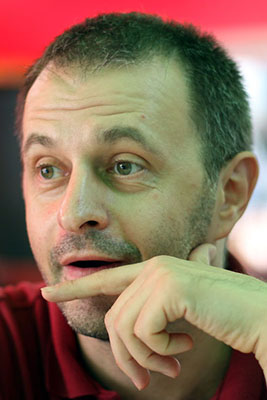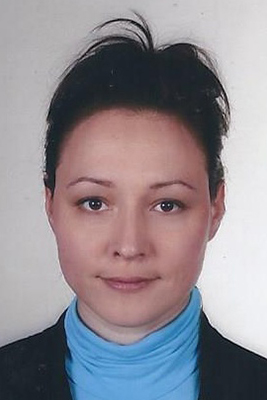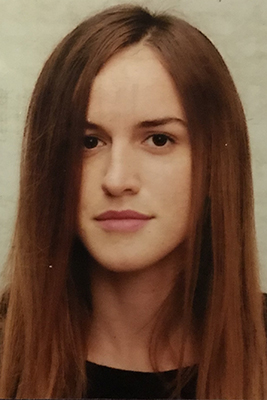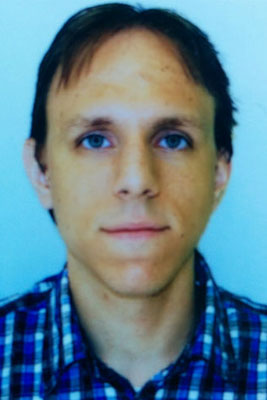National Institute of the Republic of Serbia
ὅδε οἶκος, ὦ ἑταῖρε, μνημεῖον ἐστιν ζωῶν τῶν σοφῶν ἀνδρῶν, καὶ τῶν ἔργων αὐτῶν
 Tatjana Davidović, Mathematical Institute of the Serbian academy of sciences and arts
Tatjana Davidović, Mathematical Institute of the Serbian academy of sciences and artsis a research professor at the Mathematical Institute of the Serbian Academy of Sciences and Arts. She is also engaged in doctoral courses on Parallel Programming, Metaheuristics, and Optimization at the Faculty of Technical Sciences, University of Novi Sad, Serbia. She received her B.Sc. degree at Faculty of Mathematics, University of Belgrade, in 1987. and M.Sc. degree at the same faculty, in 1992, with the thesis An Approach to Parallelization of Symbolic Robot Model. In 2006 she obtained PhD degree at Faculty of Mathematics, University of Belgrade with the thesis Scheduling Tasks to Multiprocessor Systems by Applying Metaheuristics. Dr. Davidović participated in a number of scientific projects, national, bilateral, and Tempus. She is a member of the Program Committees for several international conferences related to optimization, computer science and information technology fields. Her main research interests include parallel computing, scheduling, combinatorial optimization, mathematical programming, metaheuristics. She has published 3 chapters in international monographs, 25 papers in refereed international journals, more than 50 papers in conference proceedings and she delivered three invited talks at the international conferences. According to SCOPUS database, her results were cited (excluding self-citations) 228 times and her Hirsch index is 8. Based on her scientific background, within the project she will contribute to the project realization in the domain of development and application of sequential and parallel metaheuristics to data analytics and consistency analysis in BlockChain technology. |
 Silvia Ghilezan, Faculty of technical Sciences, University of Novi Sad
Silvia Ghilezan, Faculty of technical Sciences, University of Novi Sadis a full professor of mathematics at the University of Novi Sad and Mathematical Institute, Belgrade. On several occasions, she has held visiting positions at University of Oregon, USA, École Normale Supérieure de Lyon, France, University of Turin, Italy, Radboud University, The Netherlands and McGill University, Canada. She is lecturing at all three levels of higher education in Serbia, as well as abroad. Major lines of her research, professional work and expertise are in formal methods and mathematical logic with application to programming languages, theoretical computer science, concurrent and distributed systems and mathematical linguistics. Her most recent research interests focuses on formal methods for privacy in large scale systems, computer assisted mathematical reasoning, formal methods in artificial intelligence, effective tools and novel teaching-learning methodologies, open data and open science technologies. She has initiated, assembled consortia, project managed and successfully completed several scientific and educational projects under national and international programs (FP, COST, Erasmus+, Tempus, bilateral). Dr. Ghilezan has provided both scientific and technical consultancy and undertaken several international project reviews and evaluations. Her numerous research articles with over fifty co-authors are published in leading scientific journals and have been communicated at renowned conference. She acts as a program committee member of prestigious international conferences and is a guest speaker at leading universities worldwide. She has supervised several doctoral theses, including two theses en-cotutelle, and serves as an international jury member for doctoral theses. She has significant activities in popularization and dissemination of science with wider impact on society. Dr. Ghilezan has provided advisory consultancy for ARVR enterprises and industry. In 2013, she was knighted in the Chevalier de l'Ordre des Palmes Académiques of the French Republic. She will contribute to the project within the development of knowledge reasoning techniques and formal methods for data privacy management based on trustworthy BC technology. |
 Miodrag Mihaljević, Mathematical Institute of the Serbian academy of sciences and arts
Miodrag Mihaljević, Mathematical Institute of the Serbian academy of sciences and artshas received his B.Sc. and M.S. degrees in electrical engineering from University of Belgrade, Serbia (Yugoslavia), and received his Ph.D. degree in 1990. He is a research professor, deputy director and the projects leader at the Mathematical Institute, Serbian Academy of Sciences and Arts, Belgrade. His main research areas are: (i) cryptology & information security (in particular design and security evaluation of lightweight techniques), (ii) blockchain technology and (iii) elements of coding & information theory. He has published more than 100 research papers in the leading international journals, conference proceedings, and as certain book chapters (including over 50 papers in IEEE journals, IET Information Security, Journal of Cryptology, Phys. Rev. A, Computing, Inform. Process. Lett., LNCS, IEICE Transactions, Entropy), and over 200 publications in total. He is co-inventor of 6 granted patents in U.S, Japan and China. Dr. Mihaljević is also author/coauthor of over 30 technical reports prepared for industrial and other institutions in Serbia and abroad. His research results have been cited more than 2000 times in the leading international publications (over 2800 citation at Google Scholar, about 1400 citations at Scopus, over 1000 citations at WoS). He has participated in over 10 international and over 20 national research projects (where he has served as the Project Leader and Principal Researcher over 15 time), and has served over 200 times as the reviewer for the leading international journals and conferences. Dr. Mihaljevic is an Associate Editor of Springer journal SN Computer Science, and has served a number of times as a Guest Editor (Security & Communication Networks, CommSIS, …). He has held long-term visiting positions at: The University of Tokyo, IMAI Lab (1997-2001 and 2004-2005); Sony Computer Science Labs (2001-2002), Sony Corporation Labs (2002-2003), Tokyo; Invited Senior Researcher at the Research Center for Information Security (RCIS), National Institute of Advanced Industrial Science and Technology (AIST), Tokyo, Japan (2006-2012) and the Research Institute for Secure Systems (RISEC), National Institute AIST, Tsukuba, Japan (2012-2013); Invited Researcher and Professor at the Chuo University, IMAI Lab., Tokyo, Japan (2013-2014); and Project Professor at Institute of Industrial Science, The University of Tokyo (2014-2019), and short term visiting positions at University of Hawaii at Manoa, US, Nanjang Technological University, Singapore, Indian Statistical Institute, Kolkata/New Delhi, India. Dr. Mihaljević is a recipient of the 2013 Award of Serbian Academy of Sciences and Arts for ten years achievements, and is an elected member of the Academia Europaea from 2014. |
 Zoran Ognjanović, Mathematical Institute of the Serbian academy of sciences and arts
Zoran Ognjanović, Mathematical Institute of the Serbian academy of sciences and artsis a research professor at the Mathematical Institute of the Serbian Academy of Sciences and Arts. He was/is a visiting professor at universities in Belgrade, Novi Sad and Kragujevac (Serbia). He received his B.Sc. degree at Faculty of Mathematics, University of Belgrade, in 1987. He received his M.Sc. degree at Faculty of Mathematics, University of Belgrade, in 1993, with the thesis „A theorem prover for modal logic S4 based on the dual tableau method”. In 1999 he got PhD degree with the thesis "Some probabilistic logics and their application in computer sciences" at Faculty of Science, University of Kragujevac. Since 2002 he has been the leader of three national fundamental research projects. He participated in a number of international FP, H2020, COST and Tempus-projects. He was a Program Committee member of international conferences and the co-chair of the 15th European Conference on Symbolic and Quantitative Approaches to Reasoning with Uncertainty (ECSQARU 2019, Belgrade, Serbia, September 18-20, 2019). His research interests are: mathematical logic and its applications in computer science, artificial intelligence and uncertain reasoning, verification of protocols, automated theorem proving, applications of heuristics to satisfiability problem, and digitization of cultural and scientific heritage. He is a co-author of the monograph Probability Logics - Probability-Based Formalization of Uncertain Reasoning published by Springer, several chapters in monographs, more than 50 papers in refereed international journals, and more than 40 papers in international conference proceedings. His number of citations (excluding self-citations) and Hirsch index from SCOPUS are 241 and 8, respectively. He received the Award of Serbian Academy of Sciences and Arts in the Field of Mathematics and Related Sciences for the Year 2013 and the annual award of Serbian Ministry of Science for results in fundamental research in 2004. His role in the project concerns development of Knowledge reasoning techniques based on a formal logic and their applications for analyzing the BlockChain protocol. |
 Dragan Urošević, Mathematical Institute of the Serbian academy of sciences and arts
Dragan Urošević, Mathematical Institute of the Serbian academy of sciences and artsis a research professor at the Mathematical Institute of the Serbian Academy of Sciences and Arts. He was/is a visiting professor at university in Novi Sad (Serbia). He received his B.Sc. degree at Faculty of Mathematics, University of Belgrade, in 1987. He received his M.Sc. degree at Faculty of Mathematics, University of Belgrade, in 1994, with the thesis "Heuristics for scheduling Parallel programs on Multiprocessor systems". In 2004 he got PhD degree with the thesis "Solving problems on graphs by using Variable neighborhood search" at Faculty of Mathematics, University of Belgrade. Since 2001 he participated in a number of scientific projects, national, bilateral. He is a member of the Program Committees for several international conferences related to optimization and computer science fields. He also was the co-chair of the XIII Balkan Conference on Operational Research (BALCOR, Belgrade, Serbia, May 22-25, 2918). His main research interests include combinatorial optimization, mathematical programming, metaheuristics and computational complexity. He is a co-author of three chapters in monographs, more than 35 papers in refereed international journals, and more than 20 papers in international conference proceedings. His number of citations (excluding self-citations) and Hirsch index from SCOPUS are 936 and 17, respectively. He will contribute to the project in the domain of development and application of metaheuristics to data analytics, privacy and consistency analysis in BlockChain technology. |
 Angelina Ilić-Stepić, Mathematical Institute of the Serbian academy of sciences and arts
Angelina Ilić-Stepić, Mathematical Institute of the Serbian academy of sciences and artswas born on the 19.02.1980 in Belgrade. She has completed high school "Matematička gimnazija" in 1999, and graduated in 2004 at University of Belgrade, Faculty of Mathematics, with the major in "Theoretical Mathematics and Applications" with the GPA 9,57. She obtained master degree in 2008 at University of Belgrade, Faculty of Mathematics, module "Mathematical Logic and Theoretical Computer Science" with the paper "Application of Model Theory in the Field Theory". She has completed her PhD in 2012 at University of Belgrade, Faculty of Mathematics with the paper "Formalization of p-adic Qualitative and Conditional probablity". Since October 2004 until October 2012 she was a Teaching Assistant at University of Belgrade, Since November 2012 until September 2013 she was employed at the Mathematical Institute of Belgrade as a research assistant and from September 2013 as a research assistant professor. Her main research area is mathematical logic, specially probability logics. Her role in the project concerns development of Knowledge reasoning techniques based on formal logic and their applications for analyzing the Block Chain protocol. She published 9 papers in refereed international journals and more than 10 papers in international conference proceedings. According to SCOPUS database, her results were cited (excluding self-citations) 19 times and her Hirsch index is 2. She was a member of the project "Representations of logical structures and formal languages and their applications in computin scinces, ON 174026" financed by the Serbian Ministry of Education, Science and Technological Development. |
 Tatjana Jakšić Krüger, Mathematical Institute of the Serbian academy of sciences and arts
Tatjana Jakšić Krüger, Mathematical Institute of the Serbian academy of sciences and artsis a research assistant professor at the Mathematical Institute of the Serbian Academy of Sciences and Arts. She has received her B.Sc. and M.Sc. degree at Faculty of Mathematics, University of Belgrade and received her Ph.D. degree in applied mathematics at the University of Novi Sad, Faculty of Technical Sciences in 2017. Her primary research interests include population and nature-inspired meta-heuristics, their theoretical and experimental analysis and development of parallelization strategies for shared and distributed-memory systems. Current research activities she concentrated on design and development of meta-heuristic optimization methods that incorporate machine learning techniques for big data problems. She has participated in projects of digitization of cultural and scientific heritage and has helped to initialize digitization in Serbian astronomy. She has been a participant in number of domestic projects and she is the secretary for two seminars at MISANU. According to SCOPUS database, her results were cited (excluding self-citations) 20 times and her Hirsch index is 2. Her role in the project is to develop new AI-based tools for implementation and analysis of BC technology. |
 Šejla Dautović, Mathematical Institute of the Serbian academy of sciences and arts
Šejla Dautović, Mathematical Institute of the Serbian academy of sciences and artsis a research assistant at the Mathematical Institute of the Serbian Academy of Sciences and Arts. She received her B.Sc. degree at Faculty of Mathematics, State University of Novi Pazar, in 2015. She received her M.Sc. degree at Faculty of Mathematics, State University of Novi Pazar, in 2016. She is currently PhD student at Faculty of Mathematics, University of Belgrade. She is a co-author of two papers from 2019- one paper in international conference proceeding and one paper in a journal. Her number of citations (excluding self-citations) and Hirsch index from SCOPUS are 0 and 0. She was an Organizing Committee member of international conferences- the 15th European Conference on Symbolic and Quantitative Approaches to Reasoning with Uncertainty (ECSQARU 2019, Belgrade, Serbia, September 18-20, 2019). Her research interests are: mathematical logic and its applications in computer science, artificial intelligence and uncertain reasoning. Her role in the project concerns development of Knowledge reasoning techniques based on a formal logic and their applications for analyzing the BlockChain protocol. |
 Tamara Stefanović, Faculty of technical Sciences, University of Novi Sad
Tamara Stefanović, Faculty of technical Sciences, University of Novi Sadis a teaching assistant at the Faculty of Technical Sciences, University of Novi Sad. She received her B.Sc. degree in 2016 and her M.Sc. degree in 2019, with the M.Sc. thesis "Innovative statistical method on indicators for businessmen’s expectations about economic developments" at the Faculty of Sciences, University of Novi Sad. Currently, she is a Ph.D. student at the Faculty of Technical Sciences, University of Novi Sad. Her research field is data privacy. |
 Simona Kašterović, Faculty of technical Sciences, University of Novi Sad
Simona Kašterović, Faculty of technical Sciences, University of Novi Sadis a teaching assistant at the Faculty of Technical Sciences, University of Novi Sad. She received her B.Sc. degree at the Faculty of Sciences, University of Novi Sad with GPA 9.78 (on a scale from 6.00 to 10.00) in 2015. In 2017 she received her M.Sc. degree with M.Sc. thesis ”Kripke models for intuitionistic logic and lambda calculus” at the Faculty of Technical Sciences, University of Novi Sad. Currently, she is a Ph.D. student in applied mathematics at the Faculty of Technical Sciences, University of Novi Sad. As a recipient of Erasmus+ scholarship for PhD students, she spent three months at University Paris Diderot (Paris 7) in Paris, France, where she did a research on probabilistic lambda calculus. She has participated as a speaker in several national and international conferences and attended four summer schools. She is a co-author of three papers in international conference proceedings and one paper in a refereed international journal. She has been a participant in the project “Representations of logical structures and formal languages and their application in computing” ON 174026 financed by the Ministry of Education, Science and Technological Development. She participated in COST action CA15123: “The European research network on types for programming and verification - EUTYPES” (2015-2020). Her research interests include mathematical logic and its application in computer science: proof theory, lambda calculus, type theory; uncertain reasoning; probabilistic logic; computer assisted mathematical reasoning, formal methods for artificial intelligence. |
 Luka Matijević, Mathematical Institute of the Serbian academy of sciences and arts
Luka Matijević, Mathematical Institute of the Serbian academy of sciences and artsreceived his bachelor's and master's degree in Computer Science at the University of Belgrade, Faculty of Mathematics. Since 2019 he has been attending doctoral studies at the Faculty of Technical Sciences, University of Novi Sad, program Mathematics in Engineering. He is employed at the Mathematical Institute of the Serbian Academy of Sciences and Arts from 2018 as a research assistant trainee, where he was engaged in the project "Representations of logical structures and formal languages and their application in computing" (ON 174026) financed by the Ministry of Education, Science and Technological Development. He works on several projects in the field of digitization, and he was also a member of the organizing committees for several international conferences. He published two conference papers in the field of operational research and optimization. His main fields of interest include optimization, machine learning, and bioinformatics. |
 Đorđe Jovanović, Mathematical Institute of the Serbian academy of sciences and arts
Đorđe Jovanović, Mathematical Institute of the Serbian academy of sciences and artsis a junior research assistant trainee at the Mathematical Institute of the Serbian Academy of Sciences and Arts. He received his B.Sc. degree at School of Electrical Engineering, University of Belgrade, in 2017, with the thesis SDN-based Virtual Networks and M.Sc. degree at the same faculty, in 2018, with the thesis Implementation of Laboratory Environment for Software Defined Networks Using a Class of Zodiac FX Switches. His main research interests include network security, parallel programming, optimization algorithms. |
 Milan Todorović, Mathematical Institute of the Serbian academy of sciences and arts (associate member)
Milan Todorović, Mathematical Institute of the Serbian academy of sciences and arts (associate member)is a PhD student in computer science at Faculty of Mathematics, at University of Belgrade. He obtained his Bachelor's degree of computer science at Faculty of Mathematics with GPA 9.77 (on a scale from 6.00 to 10.00) in 2009. He received Master's degree in computer science with GPA 9.80 at the same faculty. He is employed at Mathematical Institute of Serbian Academy of Sciences and Arts since 2013, where he holds a position of special advisor. He worked on research regarding SAT problem and digitization of cultural heritage, while his current work is related to improvement of existing elements of BlockChain technology, as well as development of new algorithms for application in BlockChain technology. In addition, he works on application of BlockChain technologies in various areas such as privacy, smart grids and distributed storage of data. |